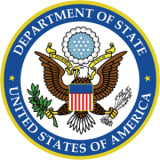The United States Department of State (DoS) is the United States federal executive department responsible for international relations of the United States. The Department was created in 1789 and was the first executive department established.
Headquartered in Washington, D.C., the Department operates the diplomatic missions of the United States abroad and is responsible for implementing the foreign policy of the United States and U.S. diplomacy efforts. The Department is also the depositary for more than 200 multilateral treaties.
Led by the Secretary of State, the Department also supports the foreign affairs activities of other U.S. Government entities including the Department of Defense, the Department of Commerce, the Department of Homeland Security, the Central Intelligence Agency, and the U.S. Agency for International Development. It also provides an array of important services to U.S. citizens and to foreigners seeking to visit or immigrate to the U.S.
There are more than 190 countries in the world, and the United States maintains diplomatic relations with some 180 of them, as well as with many international organizations.
Highlights of FY 2015 Budget Request
The President’s FY 2015 budget request for the Department of State and the U.S. Agency for International Development (USAID) is $46.2 billion.
Protecting National Security
- Middle East and North Africa ($7.0 billion). Provides robust support for Israel and Jordan while helping countries in transition like Tunisia, Egypt, Libya, and Yemen. Includes resources to provide life-sustaining aid to those displaced by conflict; to address the regional impact of the Syrian conflict; and to promote successful transitions and reforms in the region.
- East Asia and Pacific ($1.4 billion). Supports robust engagement in the Asia-Pacific region by strengthening US alliances; bolstering the region’s security architecture; focusing on economic development issues, including energy and the environment; and fostering people-to-people exchanges.
- Afghanistan and Pakistan ($3.6 billion). Protects US national security interests and sustains important investments in the stability, security, and development of Afghanistan and Pakistan. The budget focuses on developing our relationship with Pakistan’s new civilian government to lay the groundwork for stability and growth.
- International Organizations and Peacekeeping ($4.8 billion). Continues our engagement with important partners including the North Atlantic Treaty Organization and the International Atomic Energy Agency. In partnership with other nations, supports critical UN and non-UN peacekeeping missions, including efforts to advance global security in Somalia, Mali, and the Central African Republic.
- Security, Law Enforcement, Counterterrorism and Related Assistance ($1.3 billion, excluding the Middle East, East Asia and Pacific, Afghanistan, Pakistan). Reduces potential threats from international terrorist activities; illicit trafficking of weapons, narcotics, humans, and wildlife; and nuclear, chemical, and biological weapons.
- Public Diplomacy and Education and Cultural Exchanges ($1.1 billion). Continues to counter violent extremism, expand and strengthen people-to-people relationships, inform policy making, and deploy resources in strategic alignment with foreign policy priorities; fosters support for academic programs, professional and cultural exchanges, and continued growth for strategic partnerships around the world.
Strengthening the US Economy And Combating Global Challenges
- Global Health Initiative (GHI) ($8.1 billion). Reflects a comprehensive and integrated global health strategy toward achieving an AIDS-free generation and ending preventable child and maternal deaths. Includes $1.35 billion in support of the President's pledge to provide $1 for every $2 pledged by other donors to the Global Fund to Fight AIDS, Tuberculosis, and Malaria, with an additional $300 million available, if enacted, through the President’s Opportunity, Growth, and Security Initiative.
- Feed the Future ($1.0 billion). Works with partner countries to continue sustainable investments in agricultural development with the goal of breaking the vicious cycle of hunger and poverty. Improves incomes and nutrition, working from farms to markets to tables and promotes greater private sector investment in agriculture. Funding also aims to reduce long-term vulnerability to food insecurity, especially in the Horn of Africa and the Sahel.
- Global Climate Change Initiative ($506.3 million). Advances the goals of the President’s Climate Action Plan by fostering low-carbon growth, promoting sustainable and resilient societies, and reducing emissions from deforestation and land degradation. Incentivizes private sector investment, improves resilience of countries that are most vulnerable to climate and weather-related disasters, and supports fast-growing economic and regional leaders in their transition to clean energy.
- Humanitarian Assistance ($4.8 billion). Provides life-saving interventions to people affected by conflict or natural disasters. Includes $1.1 billion to respond to the humanitarian crisis in Syria. Requests $1.4 billion in P.L. 480 Title II Food Aid, continuing to support reforms within the Agriculture bill that will provide flexibility to assist approximately 2 million more emergency beneficiaries with the same level of resources.
- U.S. Global Development Lab ($151.3 million). Builds USAID’s Global Development Lab to create a world-class capability to discover, incubate, test, and scale transformational solutions that are faster and cheaper. Additional funds to accelerate progress toward development goals would be provided through the President’s Opportunity, Growth, and Security Initiative, if enacted.



